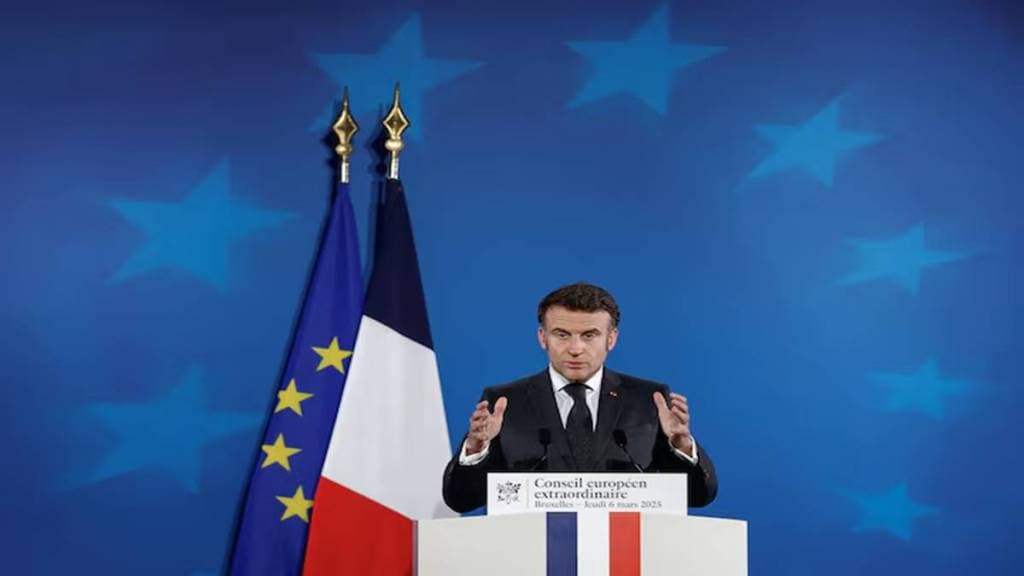French President Emmanuel Macron in a prime-time address to the nation delivered a strong message, warning that Russia poses a direct threat to France and Europe. He stressed that Europe must be ready to defend itself, particularly in light of the ongoing war in Ukraine, and suggested that European nations may need to rely less on the United States moving forward.
According to reports in the public domain, Macron hit back at Russia, after the Kremlin warned him not to threaten it with nuclear rhetoric. And went on to draw comparisons with Napoleon’s failed conquest of Russia. emamnuel macron, we
The French leader stated, “We need to be ready for that not to be the case” when it comes to US support for Ukraine, referring to the uncertain political landscape under US President Donald Trump. He stated that whether peace in Ukraine comes soon or not, Europe must bolster its defense capabilities.
“We need to provide ourselves with more arms, more equipment in terms of defense, to provide a dissuasive force,” Macron said. And warned that abandoning Ukraine would leave Europe weak, adding, “Who can believe that in this context, Russia will stop at Ukraine?”
As the conflict in Ukraine continues to unfold, Macron outlined a vision for Europe’s involvement, echoing sentiments from British Prime Minister Keir Starmer that Europe may need to intervene directly. “Our forces will be there if necessary to guarantee peace, not before a peace agreement is signed,” he clarified, indicating France’s commitment to a long-term resolution.
Significance of his statements
Macron’s statements come at a time of heightened tension between Ukraine and Russia, and amidst growing skepticism in the US about continuing support for Kyiv. After a heated exchange at the White House last Friday between Ukrainian President Volodymyr Zelenskyy and Trump, the future of US aid to Ukraine became uncertain, a development that has alarmed both Ukraine and its European allies.
Kremlin Responds
In response to Macron’s comments, the Kremlin expressed strong disapproval. Spokesman Dmitry Peskov described Macron’s speech as “extremely confrontational,” accusing the French leader of fueling the war in Ukraine rather than seeking peace. The Russian spokesman further claimed that Macron failed to acknowledge Russia’s legitimate concerns, portraying Russia as a nation with its own set of fears and historical grievances.
Meanwhile, Dmitry Medvedev, former Russian president and outspoken critic of Western policies, ridiculed Macron’s remarks, dismissing him as “Micron” and asserting that Macron posed no threat to Russia. Meanwhile, Russian officials argue that despite Macron’s rhetoric, there is a lack of substantial military backing behind Europe’s tough talk, pointing to Russia’s battlefield gains in Ukraine as evidence.
The conflict, which has seen Russia control nearly 20% of Ukrainian territory, including Crimea and parts of the east and south, remains a flashpoint in global geopolitics. Russian President Vladimir Putin views the war as a defence against Western encroachment, particularly NATO’s expansion following the collapse of the Soviet Union in 1991.
In his address, Macron also raised the prospect of extending France’s nuclear umbrella to protect its European allies, a significant policy shift given the growing security concerns.
While Russia and the United States maintain the largest nuclear stockpiles, with over 5,000 warheads each, France holds a formidable position with 290 nuclear warheads, according to the Federation of American Scientists. The United Kingdom follows with 225 warheads, while China, with its own nuclear ambitions, possesses approximately 500 warheads.
Despite Macron’s calls for stronger European defence and a potential extension of France’s nuclear deterrence, the path to peace in Ukraine remains elusive. Ukrainian President Zelenskyy expressed gratitude for France’s support but reiterated that any peace agreement must be robust, emphasizing that it could not involve Ukraine’s capitulation to Russia. He said peace must be “real, not just a word,” with strong security guarantees to ensure lasting stability.
With Macron’s firm stance on Russia, Europe appears poised for a more self-reliant defence posture, but the outcome of these geopolitical shifts remains uncertain.


